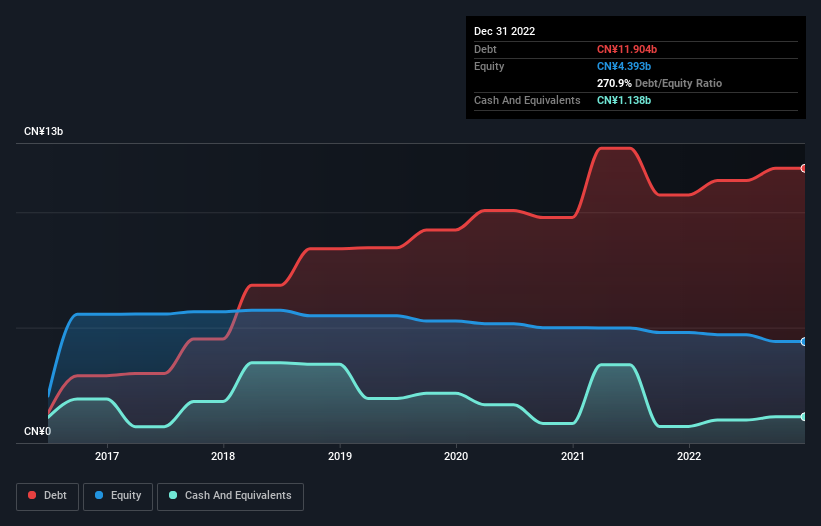- Hong Kong
- /
- Real Estate
- /
- SEHK:1329
These 4 Measures Indicate That Beijing Capital Grand (HKG:1329) Is Using Debt Extensively

Warren Buffett famously said, 'Volatility is far from synonymous with risk.' So it seems the smart money knows that debt - which is usually involved in bankruptcies - is a very important factor, when you assess how risky a company is. Importantly, Beijing Capital Grand Limited (HKG:1329) does carry debt. But the real question is whether this debt is making the company risky.
When Is Debt A Problem?
Generally speaking, debt only becomes a real problem when a company can't easily pay it off, either by raising capital or with its own cash flow. Ultimately, if the company can't fulfill its legal obligations to repay debt, shareholders could walk away with nothing. While that is not too common, we often do see indebted companies permanently diluting shareholders because lenders force them to raise capital at a distressed price. Having said that, the most common situation is where a company manages its debt reasonably well - and to its own advantage. The first thing to do when considering how much debt a business uses is to look at its cash and debt together.
View our latest analysis for Beijing Capital Grand
How Much Debt Does Beijing Capital Grand Carry?
The image below, which you can click on for greater detail, shows that at December 2022 Beijing Capital Grand had debt of CN¥11.9b, up from CN¥10.7b in one year. However, it does have CN¥1.14b in cash offsetting this, leading to net debt of about CN¥10.8b.

How Healthy Is Beijing Capital Grand's Balance Sheet?
The latest balance sheet data shows that Beijing Capital Grand had liabilities of CN¥3.91b due within a year, and liabilities of CN¥11.5b falling due after that. Offsetting these obligations, it had cash of CN¥1.14b as well as receivables valued at CN¥220.1m due within 12 months. So its liabilities total CN¥14.1b more than the combination of its cash and short-term receivables.
This deficit casts a shadow over the CN¥1.30b company, like a colossus towering over mere mortals. So we definitely think shareholders need to watch this one closely. At the end of the day, Beijing Capital Grand would probably need a major re-capitalization if its creditors were to demand repayment.
We measure a company's debt load relative to its earnings power by looking at its net debt divided by its earnings before interest, tax, depreciation, and amortization (EBITDA) and by calculating how easily its earnings before interest and tax (EBIT) cover its interest expense (interest cover). Thus we consider debt relative to earnings both with and without depreciation and amortization expenses.
Weak interest cover of 0.31 times and a disturbingly high net debt to EBITDA ratio of 63.9 hit our confidence in Beijing Capital Grand like a one-two punch to the gut. The debt burden here is substantial. Even worse, Beijing Capital Grand saw its EBIT tank 50% over the last 12 months. If earnings continue to follow that trajectory, paying off that debt load will be harder than convincing us to run a marathon in the rain. When analysing debt levels, the balance sheet is the obvious place to start. But you can't view debt in total isolation; since Beijing Capital Grand will need earnings to service that debt. So when considering debt, it's definitely worth looking at the earnings trend. Click here for an interactive snapshot.
Finally, a business needs free cash flow to pay off debt; accounting profits just don't cut it. So it's worth checking how much of that EBIT is backed by free cash flow. During the last two years, Beijing Capital Grand generated free cash flow amounting to a very robust 90% of its EBIT, more than we'd expect. That puts it in a very strong position to pay down debt.
Our View
To be frank both Beijing Capital Grand's EBIT growth rate and its track record of staying on top of its total liabilities make us rather uncomfortable with its debt levels. But on the bright side, its conversion of EBIT to free cash flow is a good sign, and makes us more optimistic. After considering the datapoints discussed, we think Beijing Capital Grand has too much debt. That sort of riskiness is ok for some, but it certainly doesn't float our boat. There's no doubt that we learn most about debt from the balance sheet. But ultimately, every company can contain risks that exist outside of the balance sheet. Be aware that Beijing Capital Grand is showing 1 warning sign in our investment analysis , you should know about...
If, after all that, you're more interested in a fast growing company with a rock-solid balance sheet, then check out our list of net cash growth stocks without delay.
Valuation is complex, but we're here to simplify it.
Discover if Beijing Capital Grand might be undervalued or overvalued with our detailed analysis, featuring fair value estimates, potential risks, dividends, insider trades, and its financial condition.
Access Free AnalysisHave feedback on this article? Concerned about the content? Get in touch with us directly. Alternatively, email editorial-team (at) simplywallst.com.
This article by Simply Wall St is general in nature. We provide commentary based on historical data and analyst forecasts only using an unbiased methodology and our articles are not intended to be financial advice. It does not constitute a recommendation to buy or sell any stock, and does not take account of your objectives, or your financial situation. We aim to bring you long-term focused analysis driven by fundamental data. Note that our analysis may not factor in the latest price-sensitive company announcements or qualitative material. Simply Wall St has no position in any stocks mentioned.
About SEHK:1329
Beijing Capital Grand
Engages in the development of commercial properties in the People's Republic of China.
Slightly overvalued with imperfect balance sheet.
Market Insights
Community Narratives



